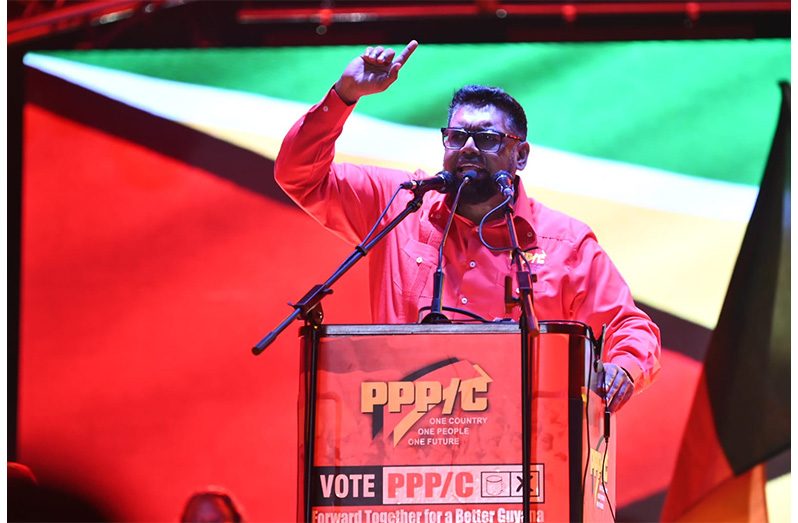–though not responsible for their predicament
MORE young Guyanese aligned with the We Invest in Nationhood (WIN) party are expected to receive letters notifying them of the closure of their bank accounts this week.
The foregoing development follows a move by three major local commercial banks to de-risk in the wake of US sanctions against WIN leader Azruddin Mohamed.
The banks at reference are: Guyana Bank for Trade and Industry (GBTI), Demerara Bank, and Citizens Bank.
The banks say their actions are in line with internal risk assessment policies and international compliance obligations stemming from the US Department of Treasury’s Office of Foreign Assets Control (OFAC) sanctions.
WIN candidates Natasha Singh-Lewis and Duarte Hetsberger had previously confirmed that their accounts were terminated, having both received identical letters from their financial institutions.
The ripple effects have now reached younger party affiliates, several of whom are reportedly facing financial disconnection.
Speaking at a packed People’s Progressive Party/Civic (PPP/C) rally in Wismar, Region 10 on Sunday evening, President Dr. Irfaan Ali spoke about the troubling trend.
“On Monday, as President, I have to know what is happening; I have to know what the risks in our society are. And I will be told on Monday that more young people will receive letters of closure of their accounts from other banks,” Ali revealed, noting that the situation is evolving.
While distancing the government from the operational decisions of financial institutions, President Ali explained that the consequences are real and painful, particularly for young people who may not have understood the implications of political alignment with a sanctioned figure.
“They did not listen; they ended up on a list… And we said to you, that is not Guyana’s problem. The global community said to you, if by association, you go this way, there will be penalty,” he said.
But rather than point fingers, President Ali called for compassion and intervention.
“Today, who is going to take care of those young people now who don’t have a bank account? They’re blaming the government; we have nothing to do with that. We warned you,” he said.
Still, he is adamant that these young citizens must not be cast aside.
“We don’t want to lose any of our young citizens. We will bring them back; we will educate them back. We will lift them up back with this development in this country,” the Head of State declared to resounding applause.
In a June 2024 statement, the OFAC stated, “Azruddin and Mohamed’s Enterprise evaded Guyana’s tax on gold exports and defrauded the Guyanese government of tax revenues by under-declaring their gold exports to Guyanese authorities. Between 2019 and 2023, Mohamed’s Enterprise omitted more than 10 thousand kilogrammes of gold from import-and-export declarations and avoided paying more than US$50 million in duty taxes to the Government of Guyana.”
Recently, US Ambassador to Guyana Nicole Theriot said that the US Government, particularly the OFAC, views any elevation of Mohamed, the leader of the We Invest in Nationhood (WIN) party, as “problematic”.
Speaking candidly with reporters at the time, Ambassador Theriot shared the views of the US Government, particularly the OFAC, concerning Mohamed.
“Yes, we are concerned anytime an OFAC-sanctioned individual has the potential to become a member of government, it’s problematic in multiple ways… We have to be very careful if that person is involved. Let’s say we were on a certain committee; we would have to be very careful in working with that committee. We have to make sure that we didn’t work with him specifically,” Theriot stated.
The Ambassador elaborated that US law strictly limits engagement with individuals under OFAC sanctions, making Mohamed’s potential entry into Parliament, whether in government or opposition, an issue of regulatory and reputational risk for both diplomatic missions and private sector interests.
“He would still be a member of government, so that would be a concern for us,” Theriot said when asked whether Mohamed’s presence in the opposition would still raise alarm.
But the Ambassador did not stop at government engagement. She raised a more urgent concern, such as the ripple effects on US investment and business confidence in Guyana.
“When you see an OFAC-sanctioned individual become a part of an official within a government, it sends concern through the private sector of the United States. So, you see, US companies are often rethinking their relationships in the country.
“We’ve seen it in Afghanistan and other countries’ companies … they look to de-risk or even cut ties. And we’re in such a beautiful position right now. All these US companies want to come to Guyana. I don’t want that to change,” Theriot explained.
PPP/C will bring back, educate, empower young citizens affected by alignment with WIN leader
SHARE THIS ARTICLE :
Facebook
Twitter
WhatsApp



.jpg)










